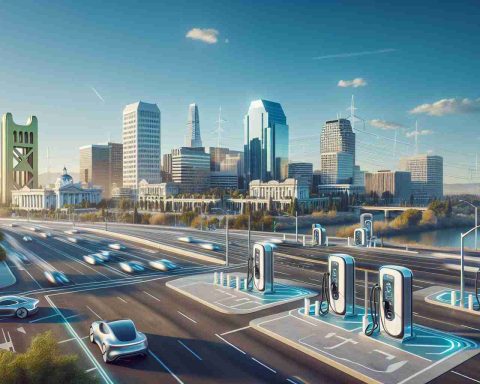The Changing Landscape of Electric Vehicle Enterprises
In a vibrant shift within the electric vehicle (EV) sector, the dynamics of innovation and economic reality are presenting major challenges for startups, evidenced by Canoo Inc.’s recent workforce downsizing. The company is grappling with immense funding pressures, resorting to furloughing 82 employees and halting operations in Oklahoma. This situation underscores the precarious balance EV startups must maintain between innovation and economic viability, particularly as they compete against well-established automakers.
Fueling the Electric Highway: Colorado’s Bold Leap
On a contrasting note, Colorado is redefining EV adoption through a visionary partnership with ChargePoint, introducing six new fast charging corridors across the state. This transformative initiative ensures that nearly 80% of Colorado’s highways are now strategically lined with fast chargers, significantly enhancing travel convenience for EV users. The collaboration not only underscores the state’s commitment to sustainable transportation but also signifies a wider trend where governments are stepping up infrastructure development to support green mobility.
Revamping Battery Efficiency: Hyundai’s Pioneering Technology
In the race to revolutionize EV efficiency, Hyundai Mobis is spearheading change with its Pulsating Heat Pipe technology. This cutting-edge innovation aims to optimize thermal management in batteries, drastically reducing charging times while enhancing overall performance. As the auto industry intensifies its focus on speed and efficiency, advancements like these are poised to redefine consumer expectations in EV technology.
Adapting to New Environmental Standards
Toyota is leading a charge towards sustainability by improving its EV battery supply chain, focusing on reusability and recycling initiatives. This move reflects a broader industry trend towards environmentally conscious practices, addressing growing concerns over battery waste management and resource sustainability.
The Future of Sustainable Transport
With the evolution of EV infrastructure, enhanced battery technologies, and robust sustainability strategies, the electric vehicle industry is on the brink of a transformative era. Startups face significant hurdles, but as the sector matures, collaborative efforts between industry pioneers and traditional automakers will play a crucial role in shaping a sustainable future for transportation.
The Intersection of EV Innovation and Environmental Sustainability
The electric vehicle (EV) industry is rapidly evolving, promising to reshape transportation with its commitment to sustainability and innovation. As evidenced by the recent developments within this sector, the growing emphasis on sustainable practices, particularly in battery efficiency and infrastructure, holds significant implications for the environment, humanity, and the global economy.
Environmental Impact: Battery Efficiency and Recycling Initiatives
One of the most pressing environmental challenges associated with EVs is the management of battery waste and the sustainability of resource extraction. The emphasis on battery efficiency, as demonstrated by Hyundai Mobis’ Pulsating Heat Pipe technology, addresses not only the need for improved performance and range but also the ecological footprint of EV production. This technology, by reducing charging times and enhancing battery life, leads to a decreased need for frequent battery replacements, thereby minimizing waste.
Toyota’s commitment to reusability and recycling further augments this environmental focus. As the company improves its supply chain to prioritize sustainability, it actively contributes to the reduction of harmful impacts associated with battery disposal. The integration of recycled materials not only preserves natural resources but also reduces environmental degradation from mining activities. Such initiatives, if adopted widely, could profoundly influence the industry’s ecological footprint, paving the way for a sustainable future.
Economic and Global Implications: Infrastructure Development
Colorado’s partnership with ChargePoint to establish fast charging corridors exemplifies how infrastructure development is intertwined with economic viability and accessibility of EVs. By making EV charging more convenient across the state, such projects are incentivizing EV adoption, which in turn, fosters market growth and innovation. As more regions worldwide follow suit, the cumulative effect could be a significant reduction in greenhouse gas emissions, thereby aligning economic growth with environmental stewardship.
The advancement of EV infrastructure also cultivates job creation and stimulates investment in technology and engineering sectors. As governments and private entities prioritize green mobility, new economic opportunities arise, fostering a shift towards a more sustainable, low-carbon economy.
Humanity’s Path to a Greener Future
The transformative era of EVs is more than just technological advancement; it is a critical transition towards sustainable transport that directly influences the potential for a healthier planet and society. By reducing reliance on fossil fuels, the widespread adoption of EVs can lead to cleaner air and reduced health risks associated with pollution. Furthermore, the collaboration between startups, traditional automakers, and governments signifies a collective effort to address climate change, highlighting a shared vision for an environmentally responsible future.
In conclusion, the ongoing developments within the EV industry are not merely adjusting the transportation landscape; they are setting the stage for a comprehensive transformation that balances economic growth with ecological and societal well-being. As innovations in battery technology, infrastructure, and sustainable practices continue to evolve, they offer promising connections to the future of humanity, underscoring the importance of fostering a sustainable and thriving global community.
Electric Vehicle Renaissance: Innovations and Challenges
FAQs about the Current State of Electric Vehicles
1. What are the trends in the electric vehicle infrastructure?
One prominent trend is the expansion of fast charging networks, as highlighted by Colorado’s initiative with ChargePoint. Such efforts are pivotal in making EV ownership more convenient and addressing range anxiety by ensuring easy access to chargers.
2. How are battery technologies evolving in the EV industry?
Recent developments, like Hyundai Mobis’ Pulsating Heat Pipe technology, demonstrate a significant shift toward optimizing battery thermal management. This innovation is expected to decrease charging times and improve battery performance, setting new standards for consumer expectations.
3. What are EV companies doing to promote sustainability?
Companies like Toyota are enhancing their supply chains to focus on battery reusability and recycling. This shift is in direct response to environmental concerns, aiming to tackle the challenges of battery waste and resource management.
Pros and Cons of Current EV Innovation
– Pros:
– The rapid development of charging infrastructure is minimizing range anxiety for EV owners.
– Advances in battery technology are leading to faster charging times and better performance.
– Increased focus on sustainability helps mitigate environmental impacts.
– Cons:
– EV startups face financial instability, struggling to balance innovation with economic sustainability.
– The high cost of developing and implementing new technologies can be a barrier for smaller companies.
– Maintaining a sustainable supply chain for batteries remains a complex challenge.
Market Analysis and Predictions for Electric Vehicles
The electric vehicle sector is on the cusp of a major transformation. With innovations in battery technology and charging infrastructure, consumer adoption is likely to increase. However, startups like Canoo Inc. face hurdles due to competitive pressures and funding issues, necessitating strategic partnerships or collaborations to thrive.
The integration of innovative technologies is expected to prop up the market, with legacy automakers such as Toyota and Hyundai setting the benchmarks. Government-backed initiatives, similar to Colorado’s highway charging project, are crucial in expanding the EV market infrastructure.
Conclusion
The future of electric vehicles lies in a delicate balance between innovation and sustainable business practices. As established automakers and startups navigate these dynamics, their collaboration will be key in driving forward a sustainable and efficient transportation ecosystem. For more insights into the automotive industry, visit Toyota and Hyundai.









